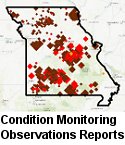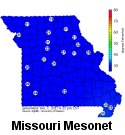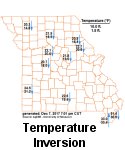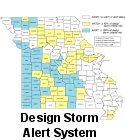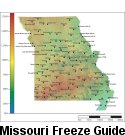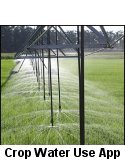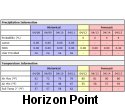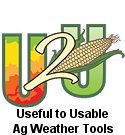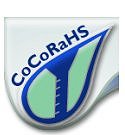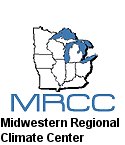
Missouri Climate Center
The Missouri Climate Center, established in July 1995, is a section of the Atmospheric Science program of the Department of Soil and Atmospheric Sciences, University of Missouri-Columbia. The center is an integrated unit of atmospheric and climate research and service in the University's College of Agriculture, Food and Natural Resources.
The primary functions of the center are: 1) develop advanced databases containing atmospheric conditions, climate variations, and ecosystem changes in the State of Missouri, 2) produce value-added products from available weather data and disseminate the products to statewide users, 3) continuously monitor and document the climate change, and 4) apply the atmospheric research tools, e.g., statistical analysis and evaluation, to assess and predict the climate change and its effects on regional atmospheric environment and ecosystem response. The center provides needed information for effective planning and management of state agriculture, industry, and natural resources.
These primary functions define that the Missouri Climate Center's research activities and service categories in relation to natural resource research and management needs and serve to define the differences with more traditional agricultural meteorology. Agricultural meteorology focuses on micro- and bio-meteorology and its effect on growth of agricultural plants and animal production. It concerns mostly the near surface weather conditions in the growing season and how they affect crop growth. The phenomena interested in by atmospheric sciences and biogeological sciences are usually time continuous and have a spectrum of scales in both space and time, e.g., from single cloud to global scales and from minutes to interannual and interdecadal time scales. These large spatial and time scale atmospheric circulation and biogeological variations are the background environment in which the regional agriculture lives. In the Missouri Climate Center these intimately related and mutually interactive disciplines are monitored and studied in an efficient manner. For example, the climate study at the center and in the Department of Soil and Atmospheric Sciences can provide an estimate of the climate variation in the region. This climate information is important for natural resources management and for agricultural planning.
The research and service activities of the Missouri Climate Center are sponsored by the University of Missouri, School of Natural Resources and Soil, Environmental and Atmospheric Sciences Department.
The Missouri State Climatologist is Dr. Pat Guinan.
Data resources at the Center
The historical and near real-time data sources at the Missouri Climate Center include.
1.) Historical data
Missouri is rich in historical weather data. Some stations' weather data date back to
1893. The historical data archived at the Missouri Climate Center are:
Daily cooperative station data in Missouri: These data include daily averaged surface temperature, maximum and minimum daily temperature, surface precipitation, snowfall and snow depths, surface evaporation, soil temperature at various depth, commentary of daily weather phenomenon. This data set covers the time period from 1893 through near present and for over 150 cooperative weather stations in Missouri. The data are in digitized databases.
Daily cooperative station data for the entire US: This data set includes quantities as in (a) for the whole United States.
Upper air observation data: These data include atmospheric soundings of temperature, geopotential height (equivalent to the pressure value at specified physical height), and wind speed and directions, from over 1700 stations worldwide. The data period covers 1955 through present. The usefulness of this data set is in the study of the global circulation change.
Part of these data are available on the center's home page.
2) Near real-time weather data from observation networks in Missouri
- Missouri automated agricultural network data:
This network includes 30 automated weather stations of the Extension Commercial Agriculture Program and of the Department of Soil, Environmental and Atmospheric Sciences of the University of Missouri over the state of Missouri. The network reports to the center near real-time surface atmospheric conditions for most weather stations every 5 minutes.
Potential usefulness of the center's research and data to the state natural resources long-term monitoring and research community
- Near surface atmospheric conditions and seasonal and annual precipitation are critical for survival and diversity of the biota and aquatic life in a region. The climate records compiled in the Missouri Climate Center provide historical information of regional atmospheric conditions in Missouri and neighboring states. They are useful for assessment and evaluation of a site in research experiment design and management.
- The automated network's weather and climate data with increasing spatial resolution over the state are useful in quality assurance of the data collected at the long-term monitoring stations/sites in the natural resources experiments. They describe the additional background atmospheric environment in which the biological changes are observed. A single station's meteorological information is not enough to describe the condition representing the dominant features of the atmospheric environment.
Dr. Zack Leasor's list of weather resources can be found at:
http://agebb.missouri.edu/weather/wealinks.htm
The Missouri Climate Center welcomes your comments and suggestions.
If you have any ideas and suggestions on how we may improve the center's function and role and better serve the center's proponents, including the natural resources monitoring and research, we will be happy to hear them. You may contact us by telephone at (573) 882-5908 or send suggestions/comments to:Dr. Zack Leasor
Director, Missouri Climate Center
University of Missouri
School of Natural Resources
320 Anheuser-Busch Natural Resources Building
Columbia, MO 65211


